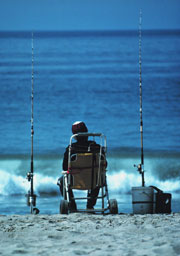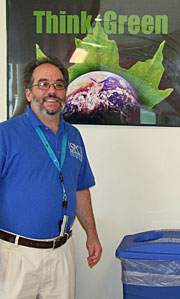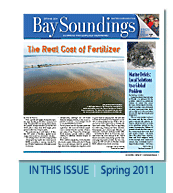 |
||||||||

Reel in the Updated Tampa Bay Boater's Guide

Photo courtesy NOAA
NOAA is conducting a nationwide survey on the economic impact of coastal fishermen.
An information-packed guide to environmentally responsible boating and angling in Tampa Bay is now available free of charge from the Tampa Bay Estuary Program (TBEP).
Produced by TBEP and the Florida Fish and Wildlife Conservation Commission's Fish and Wildlife Research Institute (FWRI), the Boating and Angling Guide to Tampa Bay was last updated in 2009. Like previous guides, the new publication features a large, fold-out map of Tampa Bay on one side, depicting natural features, recreational amenities and navigation aids. The reverse side contains photos and descriptions of bay habitats and inhabitants, along with smaller maps showing boating speed zones and a directory of important phone numbers.
In addition to the printed guide, FWRI also has updated the online guide to Tampa Bay. The interactive, digital guide contains some information not found on the printed guide, such as paddling trails, fish identification sheets, and current fishing regulations. Additionally, users can zoom in, enlarge and print out just the information they need for a specific purpose or region of the bay. The online version also includes individual web pages for fishing piers and boat ramps, with pictures and information about each facility. To view the online guide, please visit www.tbep.org and click on the Digital Boating and Angling Guide icon.
To order a hard copy of the guide, e-mail saveit@tbep.org or call (727) 893-2765. Bulk quantities also will be distributed to area bait and tackle shops, boat dealers and marinas.
NOAA Adding Up Impact of Recreational Anglers
NOAA has begun a year-long survey to determine the economic impact of saltwater recreational anglers across the 23 U.S. coastal states. Random surveys will target people who fish from shore, from docks, from party or charter boats and from privately owned boats.
"The money that millions of recreational anglers spend on fishing trips each year produces tens of thousands of jobs and billions in sales revenue," said Jane Lubchenco, under secretary of commerce for oceans and atmosphere and NOAA administrator. "This year's survey is a chance for saltwater anglers to help NOAA get an updated, accurate picture of how recreational fishing translates into economic vitality and jobs for Americans."
NOAA will ask anglers how long their fishing trips last and how much they spend on bait, boat fuel, ice, charter fees and other expenses. Anglers will also be asked to participate in a follow-up survey that will ask them to estimate what they spent on durable goods such as boats and fishing tackle used for saltwater angling over the previous 12 months.
The most recent economic study, completed in 2009, showed that anglers' expenditures generated $59 billion in sales and supported more than 385,000 jobs. For more information, visit http://www.noaanews.noaa.gov/stories2011/20110222_saltwaterangling.html
Transportation Projects Ride Off with Future of the Region Awards
Transportation was the big winner at the Tampa Bay Regional Planning Council's 2011 Future of the Region award ceremony in March with six awards. Categories ranged from education and development to the new "Going Green" and OneBay competitions.
Pinellas County Commissioner Karen Seel took top honors with the 2010 Herman W. Goldner award for regional leadership, in large part for her role in transit planning, including chairing a committee that crafted a new approach to transportation and land use to serve as a model for the state.
The New Smart Pasco plan won the One Bay category for its forward-looking plan that divides the county into five markets and establishes visions, missions and policies for each using transit-oriented development guiding principles.
Hillsborough County's Rapid Transit Investment Plan won first place in the development/infrastructure category, with Pinellas Alternatives Analysis in second. HART Flex won an honorable mention.
PSTA and its partners won both second place and an honorable mention in the public education category for their transit summit and the Transportation eTownHall.
Other environmental awards included Tampa Bay Watch's first place spot in the public education category for its Estuary Edventures program. The city of Tarpon Springs earned the top award in the natural resources category for the expansion of its reclaimed water storage facility. Winners in the "Going Green" category included the Infinitus Renewable Energy Park by Imperium Energy, Pasco County's Master Reuse System and Habitat for Humanity's Shady Grove townhome community built to LEED standards.

Photo by Jason Green
Captain Recycle reprises his role in eco-conscious living in a new series of videos produced by St. Petersburg College.
Captain Recycle Returns as Eco-Man
The St. Petersburg College Office for Sustainability has released the first of three films designed to help incorporate sustainable values and practices. The three-minute film focuses on Eco-Man, whose alter ego is that of mild-mannered SPC instructional technologist, Alan Shapiro.
The role of environmental superhero isn't new to Shapiro. As a science teacher at Boca Ciega High School in the early 1990s, Shapiro created Captain Recycle when state legislation required communities to begin recycling a certain percentage of their waste. "I wanted to get a recycling center started at the school, so I started a club we called Eco-Action," he recalled. It was so successful that the Boca Ciega recycling center became the most successful in the city.
Shapiro left Captain Recycle's cape behind when he left Boca Ciega but he's returned as the masked doer of environmental good at SPC. The first episode focuses on energy savings and spotlights simple steps that conserve energy in the work place. Two other episodes are being developed now, on recycling and on eco-friendly lifestyles. They're available online at www.spcollege.edu/sustainability.
Audubon Not Always Audubon Society
In the wake of a failed bid to put golf courses on state parks, the Audubon Society is further distancing itself from Audubon International, a not-for-profit group that is funded through the United States Golf Association and certifies golf courses as "cooperative sanctuaries."
A statement from the National Audubon Society makes it clear that Audubon International is an entity which is not related to the conservation organization. Excerpts from the statement, available online at http://audubonoffloridanews.org, include:
- Since its inception in 1991, Audubon International, funded in part by the United States Golf Association, has been certifying golf courses that pay an annual membership fee as Audubon Cooperative Sanctuaries.
- Similar fee-based certifications are available from Audubon International to developers of cemeteries, municipal parks, campgrounds, resorts, stores, industrial facilities, marinas, residential communities and preparatory schools.
- Audubon is not associated with Audubon International in any way. Audubon does not certify golf courses, or any other development, as being environmentally sound. Indeed, Audubon very often opposes such development.
- Furthermore, Audubon sanctuaries are protected natural spaces for public enjoyment. No Audubon sanctuary is certified for development.
Port Manatee Begins Dredging Berth 12
Construction on the final phase of a $200 million, 11-year-expansion will begin in April when Port Manatee starts dredging Berth 12. At 1,584 feet long with a depth of 41 feet, the berth is designed to accommodate Panamax-sized vessels. The new berth sits adjacent to a planned 52-acre container terminal on the port's south side - aimed at attracting new cargoes expected at Gulf of Mexico and East Coast ports with the completion of the Panama Canal expansion in 2014.
